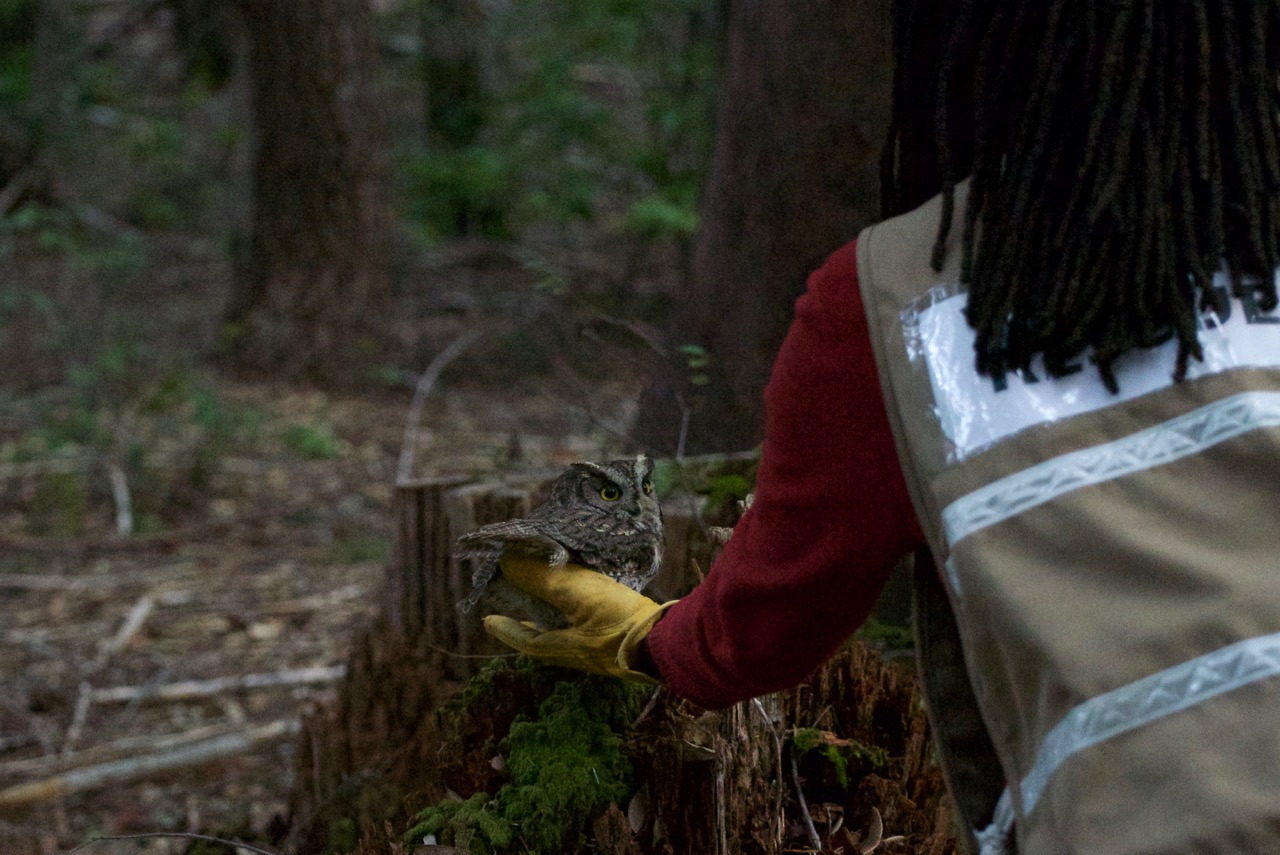
Every Autumn and Winter, as shortened days leave afternoon commuters driving home in the dark, as early evenings bring nocturnal wild animals out to forage and hunt, at Humboldt Wildlife Care Center we suddenly start admitting many more owls, mostly hit by vehicles.
Surprisingly, many owls survive their collision with speeding cars, especially smaller owls who have less mass to contribute to the energy of the impact. Less energy in the impact means the odds increase of the bird avoiding some of the life threatening outcomes, such as broken bones, dislocated joints, eye trauma and other injuries their larger cousins usually suffer when hit by vehicles.
Since the first day of Autumn 2018 until today, January 7, we’ve admitted 14 Western Screech-Owls (Megascops kennicottii) for care after they each but two were likely hit by vehicles. Sadly, this is a fairly typical number of owls for us to admit at this time of year. If past years are any indication, there are several more of these small owls yet to be hit by cars before Winter’ end.

While all but two of the 14 Screech-owls admitted this Fall and Winter were hit by vehicles, it’s also true that each came from highly rural, two lane roads away from the major highways of Humboldt County. Alderpoint, Carlotta, Bayside, Kneeland, Freshwater are the the most common locations of Screech-owls being hit by vehicles.
The Safety Corridor on US 101 between Arcata and Eureka is a special zone of mandatory headlights and a speed limit reduced to 50 miles per hour due to the businesses and intersections along those few miles of four lane highway. We know that there will be cross traffic and so we prepare for it. We slow down, we turn on our headlights and we raise our awareness, for the sake everyone’s safety.
We need to bring that same kind of awareness to our driving habits on rural highways.
The beauty of our region – the Redwood forests, the bay, the ocean, the mountains – is part and parcel of our love for our home. Here in Humboldt the Wild always makes itself felt and known – a strong sea breeze comes up from the bay through the mall parking lot, or across the Arcata Plaza. We live in a region rich in wild neighbors and to be better neighbors, we can anticipate that they are here – from Screech-owls to Spotted Owls, from Spotted Skunks to Great Egrets – we can accommodate their needs
Chiefly, we can slow down when we drive. We can remember that we steer our machinery through our neighbors’ homes. The least we can do is strive to not run them down.










Surprisingly, 14 Screech-owls admitted in 3 of the Fall/Winter months is not an unusually high number. In fact it’s well within what we call normal. The only means we have to reduce this number is to change our habits and raise our awareness. Seeing wildlife is a challenge for us all in these highly abstracted times when the natural world can seem an afterthought. Still it’s our responsibility to operate our machinery as gently as we can.
Bicyclists, pedestrians, even motorcyclists, know the horror of not being seen or expected by car and truck drivers. Share the Road! See Motorcycles! Stop for Me! Signs like these are all over our communities. Sadly the only real warnings we post about wildlife crossings are for those animals who are big enough to cause damage to people or property in a collision. We need to expand our concerns. We need Owl Awareness. We need Wildlife Watchouts!
Until we’ve managed to better share this world we don’t own, our work helping these Owls, as well as all the other wild neighbors who are orphaned, injured and in need, due to their collision with the human-built world, Your support makes it possible. Please help keep our doors open, our lights on and the frozen mice coming. Our wild neighbors in need, need you. Thank you


